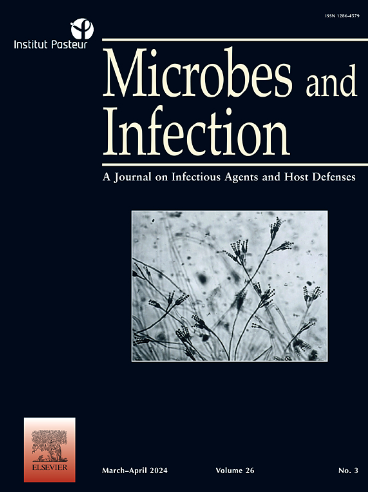Microbiota transfer early after birth modulates genetic susceptibility to chronic arthritis in mice
IF 2.7
4区 医学
Q3 IMMUNOLOGY
引用次数: 0
Abstract
Genetics is central to the susceptibility or resistance to autoimmunity, and mounting evidence indicates that the intestinal microbiota also plays an essential role. In murine arthritis models, short-chain fat acid supplementation reduces disease severity by modulating tryptophan-metabolizing bacteria. Common microbiota transfer methods modulate arthritis severity, however, they are not practical for chronic models such as pristane-induced arthritis (PIA). PIA-resistant (HIII) and PIA-susceptible (LIII) mice harbor diverse intestinal microbiomes, which might be implicated in their divergent susceptibility. To investigate this hypothesis, we used cross-fostering to stably transfer the microbiota. In this study, we show that extreme susceptibility to arthritis can be modulated by early microbiota transfer, with long-lasting effects. HIII and LIII pups were cross-fostered and injected with pristane after weaning. PIA severity in cross-fostered LIII mice was significantly reduced in the chronic phase. Metagenomic analyses showed that HIII and LIII microbiomes were partly shifted by cross-fostering. Microbial groups whose abundance was associated with either HIII or LIII mice presented similar composition in cross-fostered mice of the opposite strains, suggesting a role in PIA susceptibility. Identification of bacterial groups that modulate chronic arthritis will contribute novel insights on the pathogenesis of human rheumatoid arthritis and targets for replication and functional studies.
出生后早期的微生物群转移可调节小鼠对慢性关节炎的遗传易感性。
遗传是自身免疫易感性或抵抗力的核心,越来越多的证据表明,肠道微生物群也起着至关重要的作用。在小鼠关节炎模型中,补充短链脂肪酸可通过调节色氨酸代谢细菌来减轻疾病的严重程度。常见的微生物群转移方法可以调节关节炎的严重程度,但对于慢性模型,如普里斯坦诱导的关节炎(PIA),这些方法并不实用。PIA耐药小鼠(HIII)和PIA易感小鼠(LIII)拥有不同的肠道微生物群,这可能与它们不同的易感性有关。为了研究这一假说,我们采用了交叉培养的方法来稳定转移微生物群。在这项研究中,我们发现对关节炎的极端易感性可以通过早期微生物群转移来调节,并产生持久的影响。对HIII和LIII幼鼠进行交叉寄养,并在断奶后注射普利斯坦。交叉寄养的 LIII 小鼠在慢性阶段的 PIA 严重程度明显降低。元基因组分析表明,HIII 和 LIII 微生物组因交叉寄养而发生了部分变化。与HIII或LIII小鼠丰度相关的微生物群在相反品系的交叉寄养小鼠中呈现出相似的组成,这表明它们在PIA易感性中发挥了作用。鉴定调节慢性关节炎的细菌群将有助于深入了解人类类风湿性关节炎的发病机制,并为复制和功能研究提供目标。
本文章由计算机程序翻译,如有差异,请以英文原文为准。
求助全文
约1分钟内获得全文
求助全文
来源期刊

Microbes and Infection
医学-病毒学
CiteScore
12.60
自引率
1.70%
发文量
90
审稿时长
40 days
期刊介绍:
Microbes and Infection publishes 10 peer-reviewed issues per year in all fields of infection and immunity, covering the different levels of host-microbe interactions, and in particular:
the molecular biology and cell biology of the crosstalk between hosts (human and model organisms) and microbes (viruses, bacteria, parasites and fungi), including molecular virulence and evasion mechanisms.
the immune response to infection, including pathogenesis and host susceptibility.
emerging human infectious diseases.
systems immunology.
molecular epidemiology/genetics of host pathogen interactions.
microbiota and host "interactions".
vaccine development, including novel strategies and adjuvants.
Clinical studies, accounts of clinical trials and biomarker studies in infectious diseases are within the scope of the journal.
Microbes and Infection publishes articles on human pathogens or pathogens of model systems. However, articles on other microbes can be published if they contribute to our understanding of basic mechanisms of host-pathogen interactions. Purely descriptive and preliminary studies are discouraged.
 求助内容:
求助内容: 应助结果提醒方式:
应助结果提醒方式:


